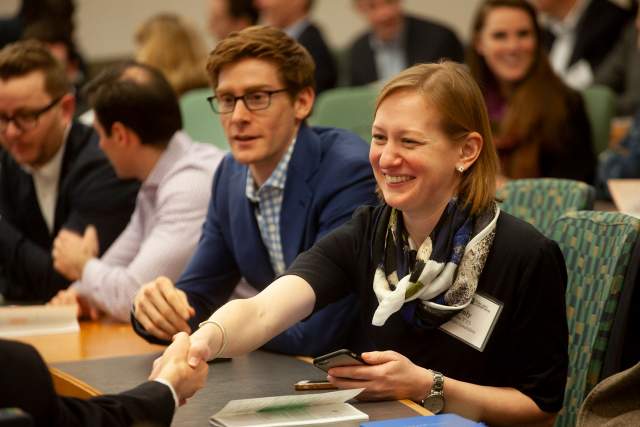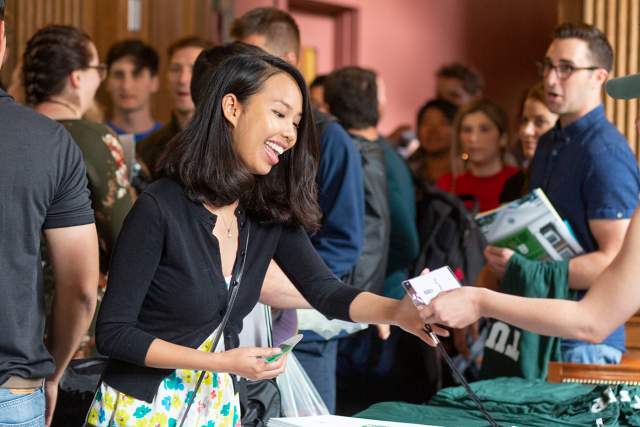As more and more Tuckies venture out into the world to better the world through business, Tuck continues to strengthen its resources to better support alumni across all regions.
As part of these efforts, last summer Dean Matthew Slaughter sat down with faculty and staff to take a closer look at three of Tuck’s longstanding global councils that were designed to strengthen Tuck’s presence in various regions around the world.
“We’ve decided to expand the reach and impact of our vital alumni leadership groups so that all Tuckies see themselves reflected in our alumni leadership structure,” says Dean Slaughter. “Our priority is to make sure that everyone is represented. The world needs Tuck, but Tuck also needs the world.”
Tuck’s global presence has expanded greatly since the original three councils were implemented by Paul Danos, who served as Tuck’s dean for two decades.
“Paul felt that a group of global alumni councils could help strengthen the Tuck brand abroad as well as assist in recruiting students from countries and providing job opportunities in these regions,” says Erin Tunnicliffe T’97, associate dean for advancement. “That was a groundbreaking idea, and it did a lot for Tuck because it engaged many more of our alumni and greatly helped our global efforts.”
The role of each council is to work closely with the dean’s office to recruit the best MBA students from around the world, expand career opportunities, build relationships with corporations, assist in developing targeted programmatic and curricular activities, and strengthen Tuck’s global brand.
Our message to students and alumni is that no matter what country of residence you’re from, Tuck is thinking about the issues that matter to you as a businessperson.
The changes to each global council come as Tuck continues to set new records for global student recruitment. The class of 2021, for example, spanned 45 countries by citizenship, which was the highest number of countries ever represented by a single class in Tuck’s history. In Africa especially, Tuck has a much larger presence than it did a decade ago.
“When Dean Slaughter sat down with us to take a look at the councils, we realized that there were entire continents and countries being left out by the old framework,” says Chris Jacobsen, managing director of board engagement and advancement initiatives. “We realized that we needed to update our councils to reflect changes in our presence around the world. Our message to students and alumni is that no matter what country of residence you’re from, Tuck is thinking about the issues that matter to you as a businessperson.”
According to the new framework, effective January 1, 2020, the European Council will become the Europe, Middle East, and Africa (EMEA) Council. It will update the original council that was established in 2011. Several new members will be added to represent Africa as well as the Middle East.
Tore Rynning-Nielsen T’85, chair of the EMEA Council, says the enhanced council will expand Tuck’s global footprint among prospective students, alumni, and corporate partners. “There is great potential to bring more Tuck knowledge and content into EMEA to develop our brand in this region and to encourage more prospective students to apply to Tuck,” he says.
In addition, the Asian Council will become the Asia Pacific Council. It now accounts for Oceania and includes both Australia and New Zealand. Finally, the Latin American Council will become the Latin America and Caribbean Council.
Guillermo Jasson T’90, chair of Tuck’s Latin America and Caribbean Council, has been working to energize the alumni network in the region by scouting strong candidates for Tuck and spearheading more experiential learning opportunities. “The stronger our alumni network, the stronger the council’s ability will be to enhance Tuck’s presence in the region,” Jasson says.
These three global councils, paired with Tuck’s Board of Advisors and the MBA Council, comprise Tuck’s alumni leadership structure. Their members are energetic, dedicated advisers who provide broad oversight on Tuck and advise on issues that pertain to the MBA program. Jacobsen encourages alumni to reach out to him if they would like to nominate a candidate for a council in their region.

